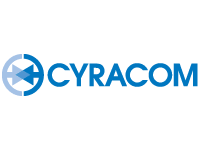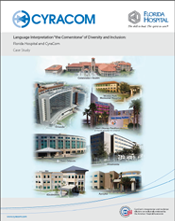Resource:
Florida Hospital: Language Interpretation "the Cornerstone" of Diversity and Inclusion
Hear how language services, including education, cultural competency, diversity and inclusion programs, increased care outcomes and satisfaction for patients with limited English proficiency.
Florida Hospital and CyraCom
With a non-English speaking patient base that approaches nearly 50 percent at some of its facilities, Florida Hospital understands the complexities of crosscultural communication. To reach out to its multilingual patients, the organization takes a practical approach, operating a comprehensive diversity and inclusion program, which focuses heavily on interpretation services:
“Interpretation services function as a practical application module in our overall diversity and inclusion program,” explains Diversity Officer Louis Preston. “Diversity can be pretty philosophical; however speaking another person’s language is very practical.”
Building the Interpretation Program
Florida Hospital’s interpretation program started taking shape in 2004. Jean Aldridge, an experienced nurse with an academic specialty in counseling and a multicultural background, built the program from the ground up. “At one point, we weren’t handling interpretation challenges to the best of our ability,” says Louis Preston. “However, one of our employees, Jean Aldridge, stepped up and created our interpretation program and it really took off.”
The program gained traction, Preston explains, because of Jean’s knowledge about interpretation and her commitment to reaching out to non-English speakers. “Her knowledge about interpretation was beyond compare. She also had cross-cultural sensitivities built into her DNA, since she was born in Africa to parents who were both missionary doctors ministering there,” says Preston. “Those are the two things required to build an effective interpretation program: knowledge and passion.”
The program started out with the premise of having interpretation available for all limited English speaking patients. Since phone interpretation is generally easy to access, providing connections to interpreters in multiple languages, the service was selected as the best method for meeting this need. Initially, Florida Hospital utilized a local language services provider. However, they eventually decided to use CyraCom’s services:
“We did a three-month evaluation with CyraCom in our Labor and Delivery unit,” explains Jean Aldridge, Interpreter Services Coordinator. “After seeing our reduced call time and witnessing the quality of interpretation we decided to switch providers. Their exclusive endorsement by the American Hospital Association also helped us make the decision because we are committed to providing the highest level of care.”
CyraCom’s phone interpretation service proved effective, helping hospital staff and patients connect to trained interpreters quickly.
However, other services were also required: “For the majority of spoken languages we could use phone interpretation,” explains Andrea Romero, Interpreter Services Manager. “However, a significant number of our non-English speaking patients were undergoing therapy and staying in the hospital for a long time. In cases such as these, patients are usually going through a hard time, and using in-person interpreters, as opposed to phone interpreters, is the preferred method because patients can see and communicate with real people, which is more emotionally satisfying. Also, many of our patients were Deaf and Hard of Hearing and required ASL interpretation services. So, in a nutshell, we had to find solutions in addition to phone interpretation.”
To respond to these needs, Florida Hospital started employing in-person interpreters at its multiple hospital campuses and focused on training bilingual staff to become interpreters. “Among our nearly 18,000 employees, if any bilingual person wanted to be an interpreter, we really pushed them to become qualified through state regulations,” says Romero. “We also rolled out Video Remote Interpretation throughout the organization to respond to our Deaf and Hard of Hearing community’s needs. We’re very pleased with what we’ve been able to do and where the program is headed,” exclaims Romero.
Interpretation and Diversity Initiatives: Today and Tomorrow
Today, the interpretation program today continues to go ahead full steam, with one of the main focuses being in-person interpretation. “Since the majority of our Limited English Proficient patients speak Spanish, we have Spanish-speaking, in-person interpreters at all of our facilities,” says Andrea Romero. “To ensure that all of our interpreters are qualified, we require all prospects to complete a minimum of 40 hours’ interpretation training and to take CyraCom’s Medical Interpreter skills assessment.”
Along with providing its patients with high quality, medical interpretation, another major focus for Florida Hospital is staying in tune with the community. “We really try to keep track of what’s going on with the community, as well as what’s going on with the hospital, “says Romero. “At registration we ask patients their language preference, with the aid of language charts, and track all data by language preference at all of our locations.” She continues:
“All of these efforts are helping us towards our goal of creating a truly diverse and inclusive organization.” Looking towards the future, the organization also has some big plans.
“We have three practical goals that we’d like to move forward with,” says Louis Preston. “First, we’d like to implement language signs for our top languages around the hospital system. That way, our patients - whether they speak Spanish, Haitian Creole, Portuguese, Arabic or Vietnamese - won’t have to worry about finding their way around the hospital. Second, we’re installing machines where you push a button; a digitized person comes up speaking to you in your preferred language with the ability to guide you to everywhere you need to be in the hospital.
Lastly, we’re looking to place universal health symbols around our eight campuses to better communicate with people of all races and languages.”
Ultimately, the end result of all these goals is to improve inclusion for all of its patients, as Andrea Romero explains:
“We want to make sure that when our patients step into the hospital, they don’t feel that they have stepped into just another institution. We want to make sure that they know they’re being actively thought about and that their language preference is considered.”
“When it comes down to it,” she says, “what we really want is for them to feel welcomed and at home.”
A History of Diversity and Inclusion at Florida Hospital
For Florida Hospital, interpretation services strike at the essence of what diversity and inclusion are all about:
“Languages learned at birth are very fundamental in creating particular social nuances, and diversity and inclusion are concerned with cultural mores, traditions and lifestyles,” says Louis Preston. “I believe language interpretation relates directly to these concepts - it’s probably the most real thing that we can have in a discussion as to why diversity is necessary in today’s corporate setting.”
To complement its interpretation service offerings, Florida Hospital also engages in a number of diversity and inclusion activities to promote cross cultural communication. The organization continually works towards improving staff diversity and currently has a staff that closely resembles the community it serves. Additionally, Florida Hospital has also developed nearly 26 diversity and inclusion courses, discussing concepts such as cultural competency, diversity management, and communicating across language barriers. These have been influential for employee training and development: in 2011 alone, 99 courses were taught with 3,857 employees in attendance.
At its East Orlando campus, the organization has also created the “Hispanic Patient Experience”, which is a customized cultural competency program designed to enhance the patient experience for the Hispanic Community which makes up more than 40 percent of this campus patient population. Since its inception, the program has achieved tremendous success: in its first three-months, Latino patient satisfaction was documented at 94 percent and 98 percent of patients families stated they would recommend the East Orlando hospital to their peers.
“We’re very pleased with where our diversity and inclusion program is going,” says Louis Preston. “We started the program nearly 27 years ago. However, for a long time the program was focused on complying with federal regulations - Title VI of the Civil Rights Act of 1964 and the like. Over the past decade, we’ve moved away from that approach and started examining how we run our organization and how that affects our patient population. Diversity is a big topic now, more so than twenty years ago, and we’re taking a hard look at healthcare disparities among minorities, leading us to focus more on cross- cultural competencies, including communication.”
“We’re very excited to see what the future has in store for us,” Preston says.
About Florida Hospital
For more than one hundred years, the mission of Florida Hospital has been to extend the health and healing ministry of Christ. Opened In 1908, Florida Hospital is comprised of eight hospital campuses housing more than 2,200 beds and 20 walk-in urgent care centers. With more than 17,000 employees — including 2,000 doctors and 4,000 nurses — Florida Hospital serves Central Florida residents and visitors of the number-one tourist destination in the world. As a faith-based Christian hospital, Florida Hospital provides whole-person care to more than one million patients a year, focusing not only on the body, but on the mind and spirit as well.
About CyraCom
CyraCom’s innovative language solutions have helped over 1,800 clients, such as Florida Hospital, attain excellence in their practices. Our ISO 9001:2008 certification and exclusive endorsement from the American Hospital Association for our interpretation and translation solutions demonstrate our commitment to quality. Visit www.cyracom.com to learn more about our suite of language services.

